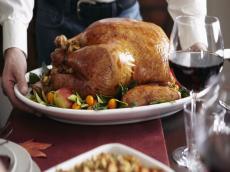|
|
TODAY.AZ / Weird / Interesting
How our body react to holiday food excess
24 December 2015 [15:15] - TODAY.AZ

“Comfort food” is in greater demand at certain times of year more than others, be it due to short days and worsening weather, or simply the gastronomic indulgence of seasonal parties.
If you're reading this in the Northern Hemisphere, bear in mind that your evolutionary programming means you’re primed to seek out calorific food sources in winter. "As it gets less light, people’s moods will be affected by that,” says Emily Henderson, a medical anthropologist at the University of Durham, “and that in turn will lead to changes in eating.” This includes turning to sweet treats and extra roast potatoes.
The question is, if you live an otherwise healthy lifestyle, is it OK to let loose once in a while?
The answer is both yes and no – it’s all a matter of “how much”, says Barry Campbell, a gastroenterologist at the University of Liverpool.
For starters, it's not just weight gain or cholesterol that you have to consider. The bacteria in our digestive tract are impacted when we eat overly fatty foods, for instance. Studies have suggested that the proportions of beneficial and harmful bacteria can be adversely affected.
If such a pattern of eating continues, that could lead to long-term issues such as an inflamed gut, says Campbell. But there’s hope. Our microbiome has the capacity to rebound.
“Actually none of these things are totally bad for you, if it’s in moderation,” explains Campbell. “The shifts you’ll see on a binge are obviously not good in the short-term sense but they’re not going to cause long-term damage.”
A one-off day of moderate indulgence followed by a gastronomically frugal period of more careful eating could, then, be considered perfectly healthy.
Certain vegetables are particularly good for us – and high on that list is the Brussels sprout
There’s more bright news for Christmas eaters. Campbell adds that certain vegetables are particularly good for us – and high on that list is the Brussels sprout. They’re rich in antimutagens which might play a role in lowering the risk of bowel cancer. The antimutagens counter the effect of proteins known as lectins, which can be quite damaging. “They can change the cells or even cause cell death,” comments Campbell.
He adds that vegetarians, despite cutting out lectin-rich meats, may still be at risk if they consume a lot of protein-filled legumes. Brussels all round, then.
Jonathan Hoare, a gastroenterologist at The London Clinic, agrees that single bouts of overeating are nothing to worry about. “One day won’t do anything – it might give you indigestion that night though,” he says.
But he points out that what might really impact our health following seasonal periods is the fact that feasting is seldom confined to just one day. An illustration of this comes from the findings of a paper published in the New England Journal of Medicine. Contrary to popular wisdom, weight gain among surveyed Americans was not as sharp during the holiday period as might be expected. However, people failed to shed the extra pounds after the holidays, making their weight accumulate year-on-year.
“The net 0.48kg weight gain in the fall and winter probably contributes to the increase in body weight that frequently occurs during adulthood,” noted the paper.
Another study, this time in the Journal of Physiology, found that a bit of physical activity over festive periods can be a good thing. Some daily exercise, even when calorie intakes were much higher than normal, could be extremely beneficial, the researchers found. It led to better blood sugar control and less undesirable genetic variation in fat cells.
As Hoare comments, “The advice I’d give people is enjoy yourself but pay it back – you’ve got to have some lean days afterwards and you’ve got to out for some walks.”
URL: http://www.today.az/news/interesting/146275.html
 Print version
Print version
Connect with us. Get latest news and updates.
See Also
- 19 February 2025 [22:20]
Visa and Mastercard can return to Russia, but with restrictions - 05 February 2025 [19:41]
Japan plans to negotiate with Trump to increase LNG imports from United States - 23 January 2025 [23:20]
Dubai once again named cleanest city in the world - 06 December 2024 [22:20]
Are scented candles harmful to health? - 23 November 2024 [14:11]
Magnitude 4.5 earthquake hits Azerbaijan's Lachin - 20 November 2024 [23:30]
Launch vehicle with prototype of Starship made its sixth test flight - 27 October 2024 [09:00]
Fuel prices expected to rise in Sweden - 24 October 2024 [19:14]
Turkiye strikes terror targets in Iraq and Syria - 23 October 2024 [23:46]
Kazakhstan supplied almost entire volume of oil planned for 2024 to Germany in 9 months - 23 October 2024 [22:17]
Taiwan reported passage of Chinese Navy aircraft carrier near island
Most Popular
 Macron's fears are starting to come true
Macron's fears are starting to come true
 China deeply regrets, rejects Fitch Ratings downgrade
China deeply regrets, rejects Fitch Ratings downgrade
 Uzbekistan, Azerbaijan forge strategic tourism partnership
Uzbekistan, Azerbaijan forge strategic tourism partnership
 N. Korean leader inspects special operation units' training on day of Yoon's ouster
N. Korean leader inspects special operation units' training on day of Yoon's ouster
 Pakistan, US agree to deepen energy ties
Pakistan, US agree to deepen energy ties
 Relocation to Suqovushan village begins: 53 families to move
Relocation to Suqovushan village begins: 53 families to move
 Azerbaijani Defense Minister holds high-level military service meeting
Azerbaijani Defense Minister holds high-level military service meeting
